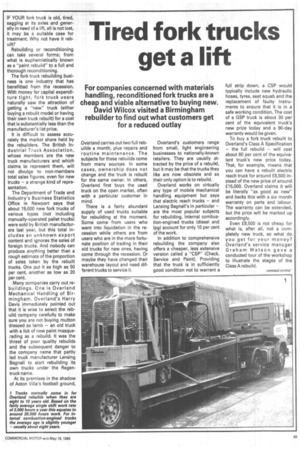Tired fork trucks get a lift
Page 87

If you've noticed an error in this article please click here to report it so we can fix it.
For companies concerned with materials handling, reconditioned fork trucks are a cheap and viable alternative to buying new. David Wilcox visited a Birmingham rebuilder to find out what customers get for a reduced outlay
IF YOUR fork truck is old, tired, sagging at its axles and generally in need of a lift, all is not lost, it may be a suitable case for treatment. Why not have it rebuilt?
Rebuilding or reconditioning can take several forms; from what is euphemistically known as a "paint rebuild" to a full and thorough reconditioning.
The fork truck rebuilding business is one industry that has benefitted from the recession.
With money for capital expenditure tight, fork truck users naturally saw the attraction of getting a "new" truck (either buying a rebuilt model or having their own truck rebuilt) for a cost that is substantially less than the manufacturer's list price.
It is difficult to assess accurately the market share held by the rebuilders. The British In dustrial Truck Association, whose members are the new truck manufacturers and which claims to represent them, will not divulge to non-members total sales figures, even for new trucks — a strange kind of representation.
The Department of Trade and Industry's Business Statistics Office in Newport says that about 15,000 new fork trucks of various types (not including manually-operated pallet trucks) were sold by British manufacturers last year, but this total in cludes an unknown export content and ignores the sales of foreign trucks. And nobody can produce anything better than a rough estimate of the proportion of sales taken by the rebuilt trucks. One put it as high as 50 per cent, another as low as 20 per cent.
Many companies carry out rebuildings. One is Overland Mechanical Handling of Bir mingham. Overland's Harry Davis immediately pointed out
that it is wise to select the reb
uild company carefully to make sure you are not buying mutton dressed as lamb — an old truck with a lick of new paint masquerading as a rebuild. It was the threat of poor quality rebuilds and the subsequent danger to the company name that partly led truck manufacturer Lansing Bagnall to start rebuilding its own trucks under the Regentruck name.
At its premises in the shadow of Aston Villa's football ground, Overland carries out two full rebuilds a month, plus repairs and routine maintenance. The subjects for these rebuilds come from many sources. In some cases, ownership does not change and the truck is rebuilt for the same owner. In others, Overland first buys the used truck on the open market, often with a particular customer in mind.
There is a fairly abundant supply of used trucks suitable for rebuilding at the moment. Some come from users who went into liquidation in the recession while others are from users who are in the more fortunate position of trading in their old trucks for new ones, having come through the recession. Or maybe they have changed their warehouse layout and need different trucks to service it. Overland's customers range from small, light engineering businesses to nationally-known retailers. They are usually attracted by the price of a rebuild, but it may be that the trucks they like are now obsolete and so their only option is to rebuild.
Overland works on virtually any type of mobile mechanical handling equipment but says that electric reach trucks — and Lansing Bagnall's in particular — are the most popular subjects for rebuilding. Internal combustion-engined trucks (diesel and lpg) account for only 10 per cent of the work.
In addition to comprehensive rebuilding the company also offers a cheaper, less extensive version called a "CSP" (Check, Service and Paint). Providing that the truck is in sufficiently good condition not to warrant a full strip down, a CSP would typically include new hydraulic hoses, tyres, seat squab and the replacement of faulty instruments to ensure that it is in a safe working condition. The cost of a GSP truck is about 30 per cent of the equivalent truck's new price today and a 90-day warranty would be given.
To buy a fork truck rebuilt to Overland's Class A Specification — the full rebuild — will cost about 60 per cent of the equivalent truck's new price today. That, for example, means that you can have a rebuilt electric reach truck for around £8,500 instead of the new price of around £15,000. Overland claims it will be literally "as good as new" and backs this with a six month warranty on parts and labour. The warranty can be extended, but the price will be marked up accordingly.
Even £8,500 is not cheap for what is, after all, not a completely new truck, so what do you get for your money? Overland's service manager Graham Watson gave a conducted tour of the workshop to illustrate the stages of the Class A rebuild.
























































































































